The Diggers 1% Free Broadside 1965 Authentic San Francisco Mime Troupe RARE AOR
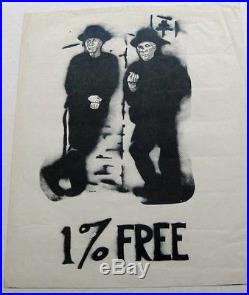
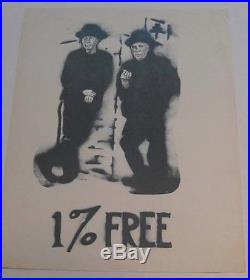
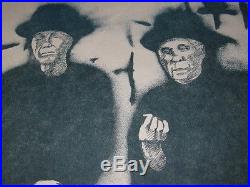
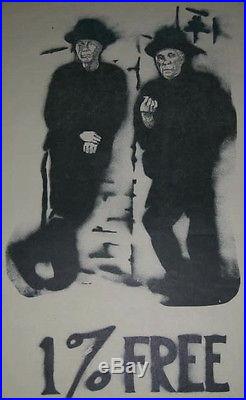
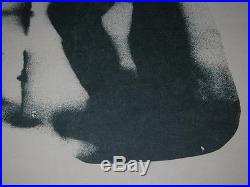
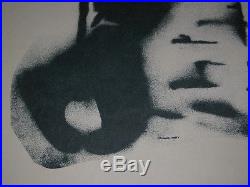
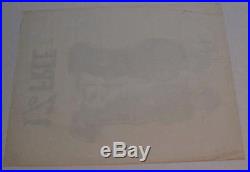




Offered for sale is an authentic 1% Free Poster published by the legendary Diggers Movement within San Francisco's Haight-Ashbury / Golden Gate Park neighborhood (circa 1965-66), which features their iconic logo and slogan first debuted in print. And is a very rare to find collector's item and historical artifact of the era - small print run / limited distribution (see bio info below). The poster measures 28" x 17.5", is in "FINE" condition (see details above), and is suitable for framing and display. The Diggers were a radical community-action group of activists and Improvisational. Actors operating from 1967 to 1968, based in the Haight-Ashbury.
Their politics have been categorized as "left-wing"; more accurately, they were community anarchists. Who blended a desire for freedom with a consciousness of the community in which they lived. They were closely associated and shared a number of members with the guerrilla theater.
Group San Francisco Mime Troupe. Was a founding member of the Diggers. The Diggers took their name from the original English Diggers. During the mid- and late 1960s, the San Francisco Diggers organized free music concerts and works of political art, provided free food, medical care, transport, and temporary housing and opened stores that gave away stock. The group was founded by Emmett Grogan. (later director of Planet Drum). And other members of the San Francisco Mime Troupe.One of the first Digger activities was the publishing of various broadsides, which were published by sneaking into the local Students for a Democratic Society. Office and using their Gestetner. The leaflets were eventually called the "Digger Papers, " and soon morphed into small pamphlets with poetry, psychedelic art, and essays.
The "Digger Papers" often included statements that mocked the prevailing attitude of the counterculture promoted by less radical figures like the Haight-Independent Proprietors (HIP), Timothy Leary. The first paper mocked the acid community, saying Time to forget because flowers are beautiful and the sun's not yellow, it's chicken! " The Digger Papers rarely included authors, although pseudonyms were sometimes used like "George Metevsky, " a reference to the "Mad Bomber George Metesky. After some HIP members tried to find out who the Diggers were, Grogan and Landout responded with a telegram that read, REGARDING INQUIRIES CONCERNED WITH THE IDENTITY AND WHEREABOUTS OF THE DIGGERS; HAPPY TO REPORT THE DIGGERS ARE NOT THAT. The Diggers provided a free food service in the Panhandle of Golden Gate Park.
Every day at four o'clock, feeding about 100 people with a stew from donated or stolen meat and vegetables that was served from behind a giant yellow picture frame, called the Free Frame of Reference, which people were required to step through before being served. The Diggers also popularized whole wheat bread. With their Digger Bread, baked in coffee cans at the Free Bakery in the basement of Episcopal. All Saints Church on 1350 Waller Street. In cooperation with All Saints Church and later via the Haight Ashbury Switchboard.
At 1830 Fell Street, they arranged free crashpads for homeless youth drawn to the Haight-Ashbury area. They opened numerous Free Stores. In Haight-Ashbury, in which all items were free for the taking or giving.
The stores offered discarded items that were still in usable condition. The first Free Store, in a six-car garage on Page Street that they found filled with empty picture frames that they tacked up on the side of the building, was called the Free Frame of Reference and was later superseded by the Trip Without a Ticket on Frederick Street. It was unclear how the stores were funded.
The 1% Free poster, showing two Chinese Tong. Assassins under the Chinese character for revolution, was thought to be demanding a 1% tithe from merchants, but that was not the case.
The poster was a challenge, implicitly suggesting that'free' people were the minority, and inciting others to step up. They also opened a Free Medical Clinic, initially by inviting volunteers from the University of California, San Francisco medical school up the hill from the neighborhood. They threw free parties with music provided by the Grateful Dead. They also staged street theater events such as driving a truck of semi-naked belly dancers through the Financial District, inviting brokers to climb on board and forget their work. To the tune of Chopins Death March. This was a precursor to the happening The Death of Hippie, staged in October 1967. In The Death of Hippie, also staged in the Haight-Ashbury neighborhood, masked participants carried a coffin with the words "Hippie--Son of Media" on the side.This event was meant to mark the end of the era of Haight-Ashbury. The event was staged in such a way that any media outlet that simply described the happening would unknowingly transmit the Diggers' message that Hippies were a media invention. This was called "creating the condition you describe". The Diggers skillfully used this technique for media relations.
Their own publications, notably the Digger Papers. Are the origin of such phrases as "Do your own thing" and Today is the first day of the rest of your life. The Diggers fostered and inspired later groups like the Yippies.
Contrary to popular opinion, the Diggers did not fall apart but evolved into the larger and more complex Free Family. While the Free Food and Medical Clinics were responses to necessary conditions caused by the enormous influx of young people during the heyday of the hippie scene, conditions that the San Francisco government was ignoring, the Diggers' central tenet was to be "authentic".Running soup kitchens and medical clinics was not the authentic, long-term concern of the Diggers' founders. After passing those institutions on to a local Church and Dr.
David Smith to continue, the Diggers moved out of the City, creating various land bases in Forest Knolls, Olema, Covelo, Salmon River, Trinidad, and Black Bear California. In those places they integrated with other groups: The Free Bakery, the Up Against the Wall Motherfuckers. And the Gypsy Truckers, creating The Free Family. That larger group still exists informally, and many of the Diggers' children and grandchildren remain close and in contact with one another, and many (children included) are still involved with progressive causes. Various alternative communities like those the Diggers founded were covered in a documentary film made by Will Vinton.Who later went on to fame for his ClayMation clay-animation studio in Portland, Oregon, His 1970-ish documentary feature-length film was titled "Gone for A Better Deal, " which, so far, has never been released to any video format. Haight-Ashbury Golden-Gate park poet Ashleigh Brilliant.
Later known for his series of epigrams on cards and in books called "pot-Shots, " has recently released a CD of his songs, parodies of old movie and show tunes about life in the Haight. The album includes two songs about the Diggers. The Diggers' division of labor between men and women has been criticized as sexist, with male members primarily forming ideas while female members of the organization were tasked with most of the practical and instrumental work these ideas required. For instance, in providing free food, male members of the group socialized and promoted the events, while female group members did most of the work of collecting food, cooking and serving it. Decision-making in the organization was controlled by male Diggers, who either came up with or took credit for new ideas, while female Diggers, who provided much of the organization's income via welfare checks and social assistance, were sidelined. This stratification of labor typifies prefeminist-era radicalism in the sixties. Up Against the Wall Motherfuckers.Emmett Grogan (born Eugene Grogan, November 28, 1942April 6, 1978) was a founder of the Diggers. A radical community-action group of Improvisational. The Diggers took their name from the English Diggers. The San Francisco Diggers were a legendary group that evolved out of two radical traditions that thrived in the Bay Area.
In the mid-1960s: the bohemian/underground art/theater scene, and the New Left/civil rights/peace movement. The Diggers combined street theater, direct action. And art happenings in their social agenda of creating a Free City. Their most famous activities revolved around distributing free food. Free because it's yours!
" every day in the park, and distributing "surplus energy at a series of Free Stores (where everything in stock was without a price tag). The Diggers coined various slogans that became part of the counterculture and even the larger society, such as, "Do your own thing" and Today is the first day of the rest of your life. The Diggers ultimately inspired Abbie Hoffman. To undertake a similar venture on the Lower East Side of New York City. The Diggers of the 1960s also inspired present-day Food Not Bombs.
Groups who distribute free food to the hungry. Grogan's distrust of the mainstream media made it difficult for reporters to acquire more than a few details of his life. He was born on November 28, 1942 as Eugene Leo Grogan into an Irish-American family in the Bay Ridge neighborhood of Brooklyn, New York.
Grogan grew up on New York Citys mean streets, getting hooked on heroin before he was in his teens, kicking the habit and winning a scholarship to a swanky Manhattan private school, pursuing a highly profitable sideline as a Park Avenue burglar, then skipping town to enjoy the dolce vita in Italy. After high school, he attended Duke University for one year before moving to San Francisco. Grogan was also the author of Final Score, a crime novel.He married the French-Canadian actress Louise LaTraverse and had one son, Max. Grogan's 1972 autobiography Ringolevio, a Life Played for Keeps is regarded by some. As the best and only authentic book written about the underground culture of the 1960s. In the book, Grogan refers to himself by the alias "Kenny Wisdom".
Peter Coyote, in the 1990 introduction to Ringolevio states that Grogan's choice of that alias is "no accident". Dedicated his 1978 album Street Legal. Richard Brautigan dedicated the poem Death is a Beautiful Car Parked Only to Grogan. On April 6, 1978, 35-year-old Grogan was found dead on a New York City subway.
Train on the F line. He had suffered a heart attack. Close friend and Digger co-founder Peter Coyote. Stated in his foreword to Grogan's autobiography "Ringolevio" that his death was due to a heroin overdose. Grogan shunned media attention, and became increasingly suspicious of those who sought publicity.
In Ringolevio Grogan discussed the 1967 Human Be-In. Criticizing counterculture luminaries Timothy Leary.
[Ringolevio] is a hard-boiled, sometimes hard-to-believe, wildly entertaining tale that takes a totally unexpected turn when Grogan washes up in sixties San Francisco and becomes a leader of the anarchist group known as the Diggers. The Diggers, devoted to street theater, direct action, and distributing free food, were in the thick of the legendary Summer of Love, and soon Grogan is struggling with the naive narcissism of the hippies, the marketing of revolution as a brand, dogmatic radicals, and false prophets like tripster Timothy Leary. Grogan thought the HIP (Haight Independent Proprietors) merchants led by Ron and Jay Thelin. Who had sponsored events like the Human Be-In, were the primary beneficiaries of the events: The HIP merchants were astounded by their own triumph by promoting such a large market for their wares.
They became the Western world's taste makers overnight... " He objected to the "Summer of Love" enticing of young people to the Haight-Ashbury to experience hippie life, noting that an influx of residents would cause an "immigration crisis and the kids who came expecting an already-formed Utopia would end up living a desperate hand-to-mouth existence on the streets. He also decried the HIP merchants' "HIP Job Co-Op", revealing that much of the work they offered was sweatshop. He pointed out that unskilled and clerical jobs would be taken away from poor residents who depended on such work to survive.The item "The Diggers 1% Free Broadside 1965 Authentic San Francisco Mime Troupe RARE AOR" is in sale since Monday, April 03, 2017. This item is in the category "Entertainment Memorabilia\Music Memorabilia\Rock & Pop\Artists G\Grateful Dead\Posters". The seller is "graphxfan" and is located in Petaluma, California. This item can be shipped worldwide.
- Original/Reproduction: Original
- Size: 28 x 17.5"
